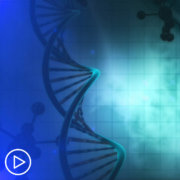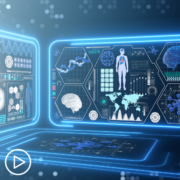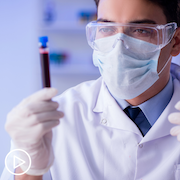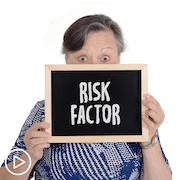Essential Testing | Optimizing AML Care With Personalized Medicine
Essential Testing | Optimizing AML Care With Personalized Medicine from Patient Empowerment Network on Vimeo.
Personalized acute myeloid leukemia (AML) care is becoming increasingly common, but how does it work? Dr. Ann-Kathrin Eisfeld defines personalized medicine and reviews the testing that should take place to help create an individualized treatment approach for patients.
Dr. Ann-Kathrin Eisfeld is Director of the Clara D. Bloomfield Center for Leukemia Outcomes Research at The Ohio State University and a member of the Leukemia Research Program at the OSUCCC – James. Learn more about Dr. Eisfeld.
Related Resources:

|

|

|
Transcript:
Katherine Banwell:
How would you define personalized medicine as it relates to AML care?
Dr. Eisfeld:
I define personalized medicine in AML as have a complete testing at time of diagnosis that consists of not only the morphology of the bone marrow, but we call immunophenotyping, which is looking at the surface markers, but also full review of all the chromosomes, which is called cytogenetics. And with those metaphase testing, I’m looking really at all of them and at the hot spots, which is done by a technique called FISH.
And then most importantly, for personalized testing, it also needs to consist of testing the most common, recurrent gene mutations. Changes in the tumor DNA that we know are contributing to the disease biology and also to the response of the leukemia to different genes.
Katherine:
I imagine that personalizing therapy for a patient requires a number of tests and then thorough review of the test results. Could you provide an overview of the tests necessary to help understand a patient’s specific AML?
Dr. Eisfeld:
Yes. Absolutely. There are multiple things that go in. And let me –even before we go into the tests – point out one thing. Because as we talk about individualized care – and it is also important to keep in mind that it will be also dependent on the age and of the performance status of the patient.
Because we know that all the changes that are going to be reviewed might be more or less severe depending on really the age of the patient we are discussing. The most critical aspect for every AML patient is a bone marrow biopsy and a bone marrow aspirate on which the testing that I have been referring to are performed.
One, it gives us information about how the – after review of the hematologist, it gives us information about the specific kind of the leukemic cell.
And very importantly – and this is a very more recent development that we know about that’s important. It also tells us whether the acute leukemia is really happening as an acute leukemia or whether the patient without knowing it before might have had a precursor issue. And this is something that by now really in just about half a year we can use in addition to direct treatment.
So, it seems like an ancient thing that we think that the microscopic review is important. But that is one part of it.
The second part – and this is, again, all based on the bone marrow biopsy. The inspection of chromosomes, as I mentioned, may be called cytogenetics. This test takes longer. It sometimes takes up to two weeks to result. And similar, looking at the tumor DNAs and mutations that is done either if you’re at a large institution such as Ohio State or other cancer centers. It’s done in house. Whereas at smaller institutions, it would be done by a sent-out testing that has these recommended gene mutation testings done. And some of those result just within a couple of days.
And these are – but we can talk. And I know we are going to talk a little bit more about it later, but we now have targeted therapies available. This is a really super exciting topic we couldn’t have talked about just even five years ago. And those mutations and those DNA changes come back usually within three to five days.
So, that we are able to decide on treatment.
Katherine Banwell:
How can someone ensure they’re getting an accurate diagnosis?
Dr. Eisfeld:
That’s a very good question. I think the most important part is to go to somebody who has seen acute leukemias as a living. It is a very rare cancer as you know. And if you are seen even by a general oncologist who might be a fantastic oncologist, he might just see one or two cases per year. And thus, might not be up-to-date on the newest recommendations. So, I can just advise anybody – even if he lives further away and trusts his physician a lot – to – for the diagnosis and for treatment planning, come to a comprehensive cancer center, at least for a therapy planning. Because what is now possible is many of these treatments is that we can just give advice.
And then you can still receive treatment in some cases really back at home. But be sure the testing was done correctly. And really give you every option to take into consideration what the best treatment would be for you, what the best treatment is for the patient. Having this trip – which can be hours of a drive. And I appreciate this. Having that done once would be, I think, the best thing to do.






